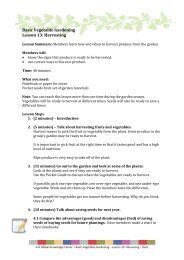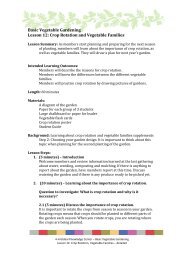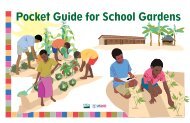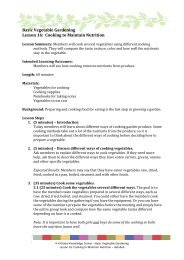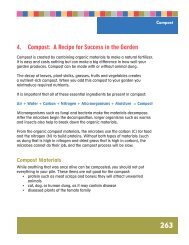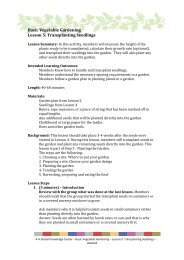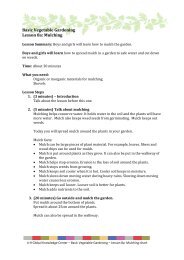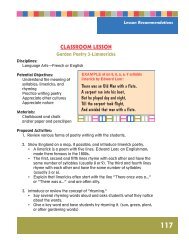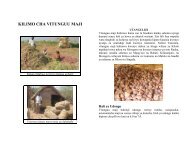Weed, Pest, Disease Management - 4-H Africa Knowledge Center.
Weed, Pest, Disease Management - 4-H Africa Knowledge Center.
Weed, Pest, Disease Management - 4-H Africa Knowledge Center.
You also want an ePaper? Increase the reach of your titles
YUMPU automatically turns print PDFs into web optimized ePapers that Google loves.
STEP 4: Tending the Garden<br />
6. Manage <strong>Weed</strong>s, <strong>Pest</strong>s and <strong>Disease</strong>s<br />
The garden is an ecosystem, and a sustainable garden generally does not<br />
incorporate the use of synthetic fertilizers or pesticides. These chemicals are<br />
expensive and usually have side effects which interfere with natural, ongoing<br />
ecological processes. For example, over-use of artificial fertilizer keeps<br />
beneficial soil bacteria and fungi from growing and helping the soil, thus<br />
leading to long-term soil infertility.<br />
<strong>Weed</strong>s<br />
<strong>Weed</strong>s compete with garden plants for water, nutrients, and sunlight, and<br />
therefore should be removed as soon as possible. When weeding, be sure to<br />
remove the roots along with the plant. Many plants will sprout again if a portion<br />
of the plant or root is left in the soil. The best way to suppress weed growth in<br />
your garden is to cover areas of exposed soil with mulch. Also, remove weeds<br />
from areas next to your garden so that fewer weed seeds will blow or be carried<br />
into your garden.<br />
<strong>Pest</strong>s<br />
• To control pests, have a variety of plants. Diversity discourages<br />
dissemination of crop-pests by insects because they must crawl/hop/fly<br />
to find the particular plant they are looking for.<br />
• Plants with a fragrance—such as onions, garlic, marigolds,<br />
cosmos, and licorice basil—deter insects because they can<br />
mask the fragrance of other plants and at<br />
the same time repel harmful<br />
insects.<br />
• Closely monitor your garden for<br />
pests. If any damage is found, try<br />
to determine the type of pest<br />
causing the damage. In many<br />
cases, if the pests are discovered<br />
early enough, they and their eggs<br />
can be removed by hand.<br />
225
STEP 4: Tending the Garden<br />
• If the infestation is beyond simply removing the pests by hand, you may<br />
need to spray a natural insecticide. Refer to Using Natural <strong>Pest</strong>icides<br />
within the section on More Gardening Science for directions on how to<br />
prepare this.<br />
• Other approaches to pest management include using nature itself. If<br />
you let chickens run through the garden, they may eat a few tomatoes<br />
but they will also eat a large number of pests and deposit a little animal<br />
dung, a natural fertilizer.<br />
<strong>Disease</strong>s<br />
Plant diseases caused by viruses, bacteria, and fungi are more difficult to<br />
control. Most microbial plant diseases take advantage of already diseased or<br />
over-stressed plants.<br />
• Monoculture (growing only one type of plant), poor soil, incorrect plant<br />
culture, improper watering (too little or too much), or poor insect pest<br />
management increases the likelihood of plants becoming diseased.<br />
• Avoid overhead watering of leaves late in the day or at night, as some<br />
plants are more likely to become infected by fungal diseases such as<br />
mildew.<br />
• If diseases are discovered early enough, try to remove the<br />
infected portions as soon as possible; after such trimming be<br />
sure to thoroughly wash your hands (and any trimming<br />
equipment) before you touch healthy plants.<br />
•<br />
Burn or discard diseased portions and do so as far as<br />
possible from your garden. If much of the plant is<br />
diseased, it is probably best to remove the entire plant<br />
and dispose of it.<br />
226
STEP 4: Tending the Garden<br />
Helpful and Harmful Animals<br />
While chickens can be helpful, animals such as goats may harm your garden<br />
by eating the plants and vegetables. It is important to keep these animals out<br />
of the garden. To do so, you can make a living hedge or a fence using living<br />
plants. This natural barrier is an easy way to keep unwanted animals away<br />
while creating fertilizer at the same time.<br />
Some plants work especially well in deterring animals. For example, if you<br />
plant Minguegue fig closely together you can create a living wall. Meanwhile,<br />
you can eat the figs and use the leaves as mulch and composting materials,<br />
and the vine creates a thicket that animals cannot easily penetrate. Adding<br />
an additional barrier of lemongrass outside of the Minguegue will create yet<br />
another layer to your border. Besides discouraging pests, lemongrass can be<br />
used as a food seasoning, a tea beverage, for mulch, and in compost.<br />
Other creatures of all sizes contribute to the<br />
richness of your garden soil.<br />
For example, earthworms aerate the soil<br />
and increase the quality of the soil.<br />
Chickens and frogs eat unwanted<br />
pests and deposit fertilizer in their<br />
dung. Bacteria that is naturally<br />
present in the soil helps mulch<br />
and dead plants decompose<br />
into soil. These various forms<br />
of life help to create a more<br />
diverse and balanced garden<br />
system.<br />
227



